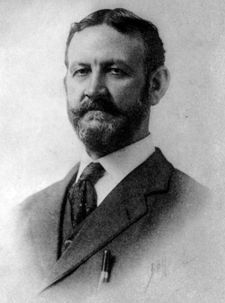Henry Clay Armstrong, Jr. (1870-1950) was an author and educator. He also served as mayor of Pensacola from 1931 to 1936.
| Henry Clay Armstrong | |
|---|---|
| Born | January 7, 1870 Notasulga, Alabama |
| Died | 1950 |
| Occupation | Mayor of Pensacola |
| Spouse | Janet Penn Armstrong |
| Parents | Henry Clay and Mary Harris Armstrong |
Armstrong graduated from the Alabama Polytechnic Institute (now Auburn University) in 1887, having studied civil engineering. He then studied political science at Johns Hopkins University before returning to the Alabama Polytechnic Institute in 1889 to serve as an instructor in English and history.
From February-September 1890, Armstrong served as personal secretary to William C. Oates, representative to the U.S. Congress from the third district of Alabama, and future governor of the state. In September 1890 Armstrong returned to the Alabama Polytechnic Institute, where he continued to teach until 1893.
From 1893-1898, Armstrong lived abroad, first serving as the United States consul in Grenoble, France, and then moving to Madrid to serve as Secretary of the American Legation. He then spent some time in Paris before returning to the United States in 1898 to serve in the U.S. Army during the Spanish-American War. For the duration of the war, Armstrong served as a captain in the 3rd Alabama Volunteer Infantry.
In 1900, Armstrong came to Pensacola to found the Pensacola Classical School, which he continued to operate for 40 years.
He published a History of Escambia County, Florida in 1930.
A "Great Floridian" plaque in his honor was placed in the Vernon McDaniel Building at 215 West Garden Street.[1]
Mayoral ousterEdit
In 1936, Mayor Armstrong, a Democrat, came out in support of the Republican presidential candidate, Alf Landon, against incumbent President Franklin Roosevelt.
In a surprise September session, while Armstrong was attending a Republican convention in New York, members of the Pensacola City Council voted to remove him from office over the matter. He was replaced by W. L. Moyer, who reportedly told the council, "I assure you gentlemen you have elected a good, strong Democrat," but died shortly thereafter.[2] Max Bear, the only council member opposed to removing Armstrong, was subsequently named mayor pro tem.
| Preceded by: J. H. Bayliss |
Mayor of Pensacola 1931-1936 |
Succeeded by: W. L. Moyer |
ReferencesEdit
- ↑ The Great Floridians 2000 Program
- ↑ Lowville N.Y. Journal & Republican, September 24, 1936.

